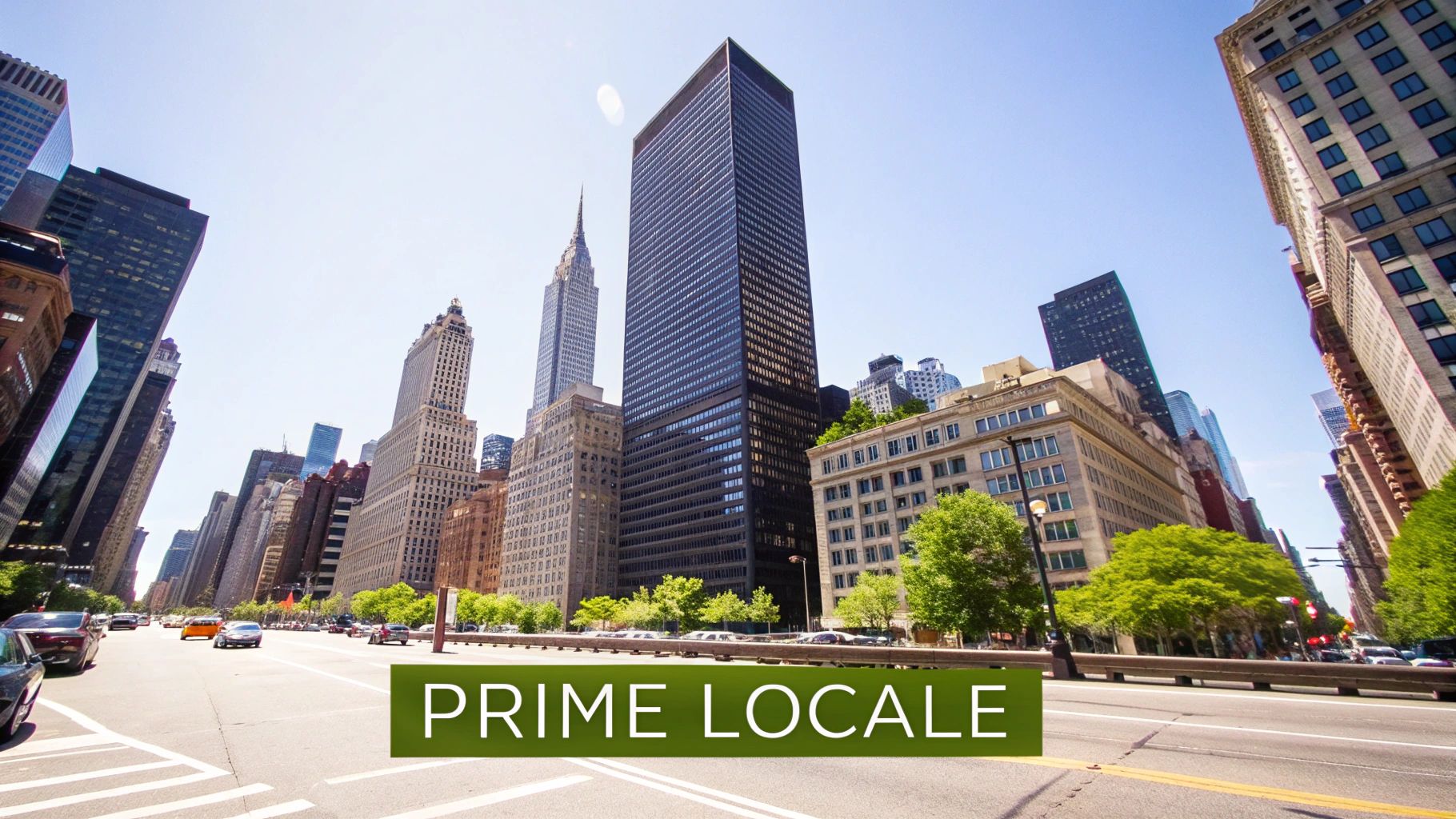The NYC Business Scene: What You're Really Getting Into

Starting a business in NYC is a unique challenge. It's exciting, complex, and demanding all at once. I've seen even the most prepared clients come in with flawless business plans, only to completely miss the mark on understanding the city's unique character. NYC isn't just a market; it's a living, breathing ecosystem.
At Cordero Law, we work hard to prepare our clients, but experiencing the city firsthand is truly the best way to grasp its nuances.
The Borough Breakdown: More Than Just Geography
New York City comprises five distinct boroughs. Manhattan, of course, is the coveted center of attention, despite its daunting rental costs. However, the other boroughs – Brooklyn, Queens, Staten Island, and the Bronx – offer their own unique advantages and challenges. They are far more than just "affordable alternatives" to Manhattan.
Each borough boasts its own personality, opportunities, and yes, even its own headaches. Brooklyn, for example, is often stereotyped as a haven for artisanal coffee shops and vintage boutiques. But beneath the surface, a vibrant manufacturing sector thrives in certain pockets. Queens, with its incredible diversity, fosters a landscape of niche businesses unlike anywhere else. Overlooking these boroughs means missing out on a wealth of potential.
The Post-Pandemic Shuffle: Industries in Flux
The COVID-19 pandemic undeniably reshaped the business landscape. Industries that once flourished are now struggling, while others have adapted and evolved into something entirely new. The restaurant industry is a prime example. Outdoor dining, once a novelty, became a lifeline and is now practically essential for survival.
Retail, particularly brick-and-mortar stores, faced significant challenges. However, many businesses pivoted to online platforms, focusing on hyperlocal delivery to thrive in the new environment. Conventional wisdom has become largely obsolete. Currently, tech, especially Fintech, continues to surge. But surprisingly, there's also a resurgence in handcrafted goods. Perhaps it's a post-pandemic yearning for authenticity and connection. The market seems to be constantly reinventing itself.
The NYC Hustle: Why We Keep Coming Back
NYC is undeniably expensive, competitive, and bureaucratic. Navigating the permit process alone can be a nightmare. So why do we persist? Because this city possesses an unmatched energy. It's a magnet for talent, capital, and a certain kind of ambition that fuels innovation.
The city's entrepreneurial spirit is a testament to its resilience. A staggering 62,000 small businesses launched between the last quarter of 2021 and the third quarter of 2023. That's a third of all the 183,000 small businesses currently operating in the city – a number higher than pre-pandemic levels. Find more detailed statistics here: NYC Small Business Boom. Despite the hurdles, the entrepreneurial dream thrives in NYC. The hustle is real. And if you can make it here, you can make it anywhere. But to succeed, you need a smart strategy. That’s where we come in. (More on that later…)
Picking Your Business Structure: It Matters More Than You Think

Choosing the right business structure for your startup in NYC is paramount. This decision has significant long-term implications, impacting everything from liability and taxes to fundraising potential. I've witnessed countless startups falter due to insufficient planning in this critical area. Choosing between an LLC, corporation (S-corp or C-corp), partnership, or sole proprietorship requires careful consideration.
The NYC Twist: Quirks You Won’t Find Anywhere Else
New York City presents unique regulatory challenges that add complexity to business formation. One example is the Publication Requirement for LLCs, mandating a six-week publication of your LLC formation in two designated newspapers. This can cost over $1,000, a significant expense for any new venture.
Another NYC-specific hurdle is the added tax on S-corporations, often overlooked by less experienced advisors. Navigating these intricacies is essential for a smooth launch in the city.
Decoding the Entities: A Real-World Look
Here's a breakdown of the most common business structures, designed to provide clarity without overwhelming you with jargon. Each structure has its own set of advantages and disadvantages, and it's important to choose the one that aligns with your specific business needs.
Sole Proprietorship: This is the simplest structure, with no legal distinction between you and your business. While easy to set up, it carries unlimited personal liability.
Partnership: Formed by two or more individuals, a partnership shares similar liability concerns as a sole proprietorship. While suitable for some small ventures, it presents risks when scaling or undertaking ventures with higher liability.
LLC (Limited Liability Company): LLCs provide personal liability protection and are relatively simple to manage. They are taxed as pass-through entities, avoiding the double taxation of C-corps. However, they are subject to the NYC publication requirement.
Corporation (C-corp): This structure offers robust liability protection and can issue stock, making it attractive for raising capital. However, C-corps face double taxation – at the corporate level and again on personal returns upon dividend distribution.
Corporation (S-corp): S-corps avoid double taxation by passing profits and losses through to personal returns. They have stricter ownership rules than LLCs and are subject to the specific NYC tax mentioned earlier.
To help you compare these different structures, I've compiled the following table:
NYC Business Entity Comparison: A side-by-side comparison of different business structures in NYC with their costs, liability protection, tax implications, and formation complexity.
| Entity Type | Formation Cost | Liability Protection | Tax Treatment | Best For |
|---|---|---|---|---|
| Sole Prop. | Low | None | Pass-through | Solopreneurs, low-risk ventures |
| Partnership | Low | None | Pass-through | Small family businesses, collaborative projects |
| LLC | Moderate | Yes | Pass-through | Startups, small to medium businesses |
| C-Corp | High | Yes | Double taxation | Large companies, IPOs |
| S-Corp | Moderate | Yes | Pass-through | Growing businesses, avoiding double taxation |
This table summarizes the key features of each entity type, but it's important to remember that every business has unique circumstances. Generic online advice isn't sufficient – consult with a legal professional to determine the optimal structure for your specific situation in NYC. More complex topics like operating agreements and shareholder agreements are crucial and covered elsewhere on our site.
The NYC Licensing Maze: What No One Tells You

Let’s be honest, navigating the New York City licensing process can feel like hacking through a dense jungle. It's almost as if it's designed to be as complicated as possible. There are over 55 different licenses spread across various city agencies, and communication between them often seems non-existent. And their websites? A whole other story.
I’ve seen it all. Restaurant clients, leases signed, and ready to launch, only to discover a hidden permit requirement that adds nine months to the timeline. Nine. Months. Imagine the rent accumulating during that time. It’s a painful reality.
Lies, Damned Lies, and City Websites
The Department of Consumer Affairs (DCA) website optimistically states that license processing takes 2-3 weeks. As an attorney, even I find that claim hard to believe. A more realistic timeframe is 2-3 months, at a minimum. And sometimes, it takes much longer.
Then there's the Department of Health. Their regulations change more frequently than the subway schedule. I witnessed a client receive a $5,000 fine for a permit they were completely unaware of. It's a harsh landscape out there.
Navigating the Madness (and Keeping Your Sanity)
So, how can you survive this licensing labyrinth? First, take a deep breath. You're not alone in this. It's challenging for everyone. Second, remember you likely don’t need all 55+ licenses. The specific requirements depend entirely on your business type. Food businesses face a completely different set of regulations compared to, say, a tech startup. Speaking of which, the tech scene here is booming. While Silicon Valley remains dominant, NYC boasts over 10,000 startups valued at $247 billion Find more detailed statistics here. It’s incredible growth. But back to licensing…
Real Talk About Licenses (and Timelines)
Here’s a general idea of what you might encounter, and I emphasize might because the specifics vary widely:
General Vendor License: If you're selling tangible goods, you'll likely need this. This applies to street vendors, retail stores, pop-up shops, and more. Expect processing to take at least a couple of months.
Food Service Establishment Permit: Restaurants, food trucks, and even some bakeries require this permit. This involves Department of Health inspections, plan reviews, and a significant amount of paperwork. Prepare for a lengthy wait.
Sidewalk Cafe License: If you envision outdoor seating, this is the license you need. However, be aware that obtaining community board approval can be quite difficult.
There are numerous other industry-specific licenses and permits, each with its own set of challenges. We can help you determine exactly what you need. The entire process is significantly smoother with guidance; otherwise, it can quickly become a disaster. I genuinely want to save you the headache, not add to it. We'll assist with gathering paperwork, preparing for inspections, and managing the legal complexities.
And this doesn’t even cover zoning regulations or the Certificate of Occupancy, which verifies that your space is legally permitted for its intended use. We’ll address those topics later.
Commercial Leases in NYC: The Traps I See Every Week

Let's face it, navigating commercial real estate in NYC can feel like venturing into a concrete jungle. I've witnessed countless enthusiastic entrepreneurs fall prey to landlords armed with predatory lease terms. It's a tough scene. Many landlords operate under the assumption that simply owning a space gives them the right to dictate any terms.
Things Your Landlord Doesn't Want You to Know
Here's the reality: negotiation is always an option. It's more feasible than you might think. Landlords, particularly in the current market, need tenants. This gives you some leverage, although they still often hold a stronger position. Forget any preconceived notions based on residential leases. Commercial leases in NYC offer minimal statutory protections.
I've seen landlords attempt to slip in clauses granting them the right to relocate your business with a mere 30 days' notice. Imagine the disruption and lost revenue that would cause. Then there are the escalation clauses. 7% annual rent increases are not unusual. These are real, recurring issues that I handle weekly, and they can be immensely frustrating for business owners.
Personal Guarantees: The Silent Business Killer
Another significant concern is the personal guarantee. This clause can lead to personal financial ruin, even if your business fails. It's a serious commitment. I've seen promising startups with solid business plans crumble because the founder was held personally liable for years of escalating rent on a vacant space.
The Commercial Rent Tax: Surprise!
Don't forget about the Commercial Rent Tax (CRT). This often overlooked tax applies to businesses south of 96th Street in Manhattan. It's a 3.9% tax on your rent, which can be a significant financial burden, especially for startups grappling with initial costs.
Red Flags: When to Walk Away (No Questions Asked)
Relocation Clauses: Unless your business model is a pop-up shop, avoid these at all costs. Stability is crucial for growth.
Unreasonable Escalation Clauses: Negotiate a reasonable annual increase, preferably tied to a predictable index.
Vague or Ambiguous Language: If anything is unclear, don't sign. Seek clarification, ideally from legal counsel. It's a worthwhile investment.
Personal Guarantees Longer Than the Lease Term: These are excessive. Limit the guarantee to a reasonable timeframe.
Negotiating Your Lease: A Few Quick Tips
Understand Your Needs: Prioritize your business's actual needs – square footage, location, amenities – and your budget.
Hire an Attorney: While I'm admittedly biased, a competent attorney can save you a significant amount of money in the long run.
Be Prepared to Walk Away: The strongest negotiating position is the willingness to walk away from a bad deal. Avoid becoming emotionally attached to a specific space.
Commercial leasing can be a minefield. But with the right guidance, you can navigate it successfully. Don't go in unprepared, and certainly don't sign anything without legal review.
Finding Money: NYC-Specific Funding Sources That Actually Work
Let's be honest, securing funding in NYC is tough. Anyone claiming otherwise is either incredibly fortunate or trying to sell you something. Forget about traditional bank loans for a brand new business; they're practically mythical. I've witnessed founders with stellar backgrounds and bulletproof business plans get rejected outright.
Grants and Programs: Ditch the Generic Advice
Most online resources offer the same tired advice: SBA loans, venture capital…boring! While these options exist, they're incredibly competitive. I want to share what truly works: NYC-specific grants and programs. The NYC Small Business Services (SBS) offers numerous grants many people don't even know exist. They're hidden gems within the city's budget.
For example, the Neighborhood 360° grant can assist with marketing, storefront improvements, and even security upgrades. While these grants aren't massive, they're targeted and surprisingly accessible. Don't overlook the borough-specific economic development corporations. Each borough has its own, offering specialized programs. Queens, for instance, has different needs than the Financial District. These programs are often easier to navigate than city-wide initiatives, with less red tape and bureaucracy.
Investors: Navigating the NYC Jungle
Angel investors and venture capitalists all claim to seek the "next big thing." However, it often feels like many are just posturing. They talk the talk but don't necessarily walk the walk. The key is finding angel investor networks genuinely invested in early-stage NYC businesses. They understand the city's unique startup challenges and are less likely to dismiss first-time founders or smaller funding requests.
These aren't the big-name VC firms you see in TechCrunch; they're smaller, more focused, and more accessible. Importantly, they don't always demand a hefty chunk of your company.
Beyond Equity: Smart Funding for Growth
Consider funding options beyond giving up equity. SBA microloans have proven effective for small businesses in NYC, particularly in sectors like food and retail. They're far more manageable than traditional bank loans. Then there's venture debt, an increasingly popular choice for later-stage startups.
Venture debt provides capital without diluting your ownership, unlike equity financing. This is invaluable if you're approaching profitability but need a temporary boost. I've helped clients secure venture debt deals that significantly changed their course.
Specialized Programs: A Level Playing Field
NYC offers specific programs supporting women- and minority-owned businesses. These programs go beyond just money, offering mentorship, networking, and invaluable resources. This isn't about charity; it's about leveling the playing field and acknowledging the unique hurdles some entrepreneurs face.
The NYC tech ecosystem is flourishing. In 2023, it attracted over $9 billion in venture capital funding, with companies like Hugging Face and Runway securing nine-figure deals. For more insights on NYC's tech scene, check out NYC Tech.
To help you navigate the funding landscape, here's a table summarizing some key resources:
To help you navigate the NYC funding landscape, here's a table summarizing key resources available to entrepreneurs at different business stages:
NYC Startup Funding Resources by Stage
Overview of funding sources available to NYC entrepreneurs at different business stages
| Funding Source | Business Stage | Industry Focus | Average Amount | Application Difficulty |
|---|---|---|---|---|
| Neighborhood 360° Grant (SBS) | Early-stage | Retail, services | Varies (up to $20,000) | Moderate |
| SBA Microloan | Early-stage | Varies | Up to $50,000 | Moderate |
| Angel Investor Networks | Seed, Series A | Tech, other high-growth | Varies (typically $25,000 – $1 million) | Difficult |
| Venture Capital | Series A and beyond | Tech, high-growth | Varies (typically $1 million+) | Very Difficult |
| Venture Debt | Later-stage | Varies, typically companies with revenue | Varies (typically $1 million+) | Difficult |
| Women- and Minority-Owned Business Programs (SBS) | Varies | Varies | Varies | Varies |
This table provides a starting point for exploring funding options in NYC. Remember to research specific program requirements and eligibility criteria.
While securing funding in NYC can be challenging, viable options exist beyond the usual suspects. It's all about knowing where to look and tailoring your approach to specific programs and investors.
NYC Employment Laws: The Stuff That Gets Businesses Sued
Look, I get it. You’re excited to start your business in NYC. The energy, the hustle, the potential… it's intoxicating. But hold on. Before you get swept up in the excitement, you absolutely must understand NYC employment laws. They're a minefield, way more aggressive than federal or even state regulations. I've seen firsthand how a minor oversight can become a five-figure penalty, wiping out months of hard work.
Paid Sick Leave: It’s Not Optional
Paid Sick Leave in NYC isn't a perk; it's the law. And it applies sooner than you might think—with just five employees. That’s practically day one for many businesses. The city actively enforces this. I've seen businesses penalized for improper sick time tracking, even when they were providing it. Get your systems and documentation in place.
The Fair Workweek Law: Scheduling Challenges
The Fair Workweek Law is a significant one, especially for retail and fast food. It dictates scheduling procedures, requires advance notice of shifts, and mandates premium pay for last-minute changes. While aiming for predictable schedules, the implementation can be a logistical nightmare. I've spent hours with clients unpacking its intricacies. It’s complex and crucial.
Discrimination: NYC's Expansive Protections
NYC discrimination laws go far beyond federal and state protections. They cover categories like caregiver status, arrest record, and even unemployment status. Unemployment status! It’s about inclusivity, but as an employer, you need to be aware of these nuances. NYC’s Commission on Human Rights is arguably the most aggressive local agency in the country regarding enforcement. Seriously.
Minimum Wage and Beyond
Yes, NYC's minimum wage is higher than the state’s. But did you know there are also industry-specific wage rules? And they change frequently. Construction, hospitality… they have their own sets of regulations. It’s a lot to keep up with. But ignoring these rules isn't an option unless lawsuits are part of your business plan. They shouldn't be.
Penalties: Significant Financial Consequences
I've seen businesses face huge fines for violations they weren't aware of. Ignorance isn't a defense. Penalties can be crippling, especially for startups. We’re talking five-figure penalties easily, impacting your business's financial health. We need to discuss the real cost of non-compliance. Understand this before you hire, not after. And definitely before you get sued.
This barely scratches the surface. We have resources on the Cordero Law website that go into more detail. Don't let this scare you off from starting your business in NYC. Just be smart, prepared, and informed. While I’m here to help navigate the legal side, it’s always better to avoid the minefield altogether.
When Things Go Wrong: Practical Damage Control
Running a business in NYC is bound to come with its share of unexpected challenges. It's almost a rite of passage, like receiving your first parking ticket or spotting a surprisingly large rat. A surprise health inspection shutdown, a difficult lease dispute, or an unexpected employee lawsuit can happen to anyone. The key to surviving these situations lies in how you react.
Crisis Mode: From Health Codes to Courtrooms
I've helped clients navigate all sorts of emergencies, from health department closures that felt like the end of the world to landlord disputes that landed in court. Administrative courts, by the way, have their own unique and sometimes baffling procedures. I've also dealt with complaints filed with the Department of Consumer Affairs. Each agency – Health, Buildings, Consumer Affairs – operates differently. Frankly, sometimes it feels like their goal is to make your life as difficult as possible.
DIY or Lawyer Up? Knowing When to Call for Help
You can likely handle some issues yourself, like minor paperwork issues with the DCA or a slightly overzealous building inspector. However, some situations absolutely require professional help. Trying to navigate a complex legal battle against an experienced landlord without an attorney is like bringing a knife to a gunfight. I’ve witnessed this scenario play out too many times, and it rarely ends well.
Prevention is Key: Avoiding Crises Before They Happen
The best way to handle a crisis? Prevent it. Here’s what my most successful clients do to stay ahead of potential problems:
Documentation is Your Friend: Maintain detailed records of everything – lease agreements, permits, employee handbooks, you name it. When things go wrong, documentation is essential.
Read the Fine Print (Seriously): Before signing anything, understand what you're agreeing to. Legal documents can be dense, but the effort upfront can save you significant headaches later.
Over-Communicate: Stay in contact with city agencies. Check in, ask questions, and build relationships. This can make a difference when an issue arises. Agencies are often understaffed and overwhelmed, and a little communication goes a long way.
Don't Cut Corners: Compliance might not be exciting, but ignoring regulations can result in hefty fines and business closures.
Build Relationships: Networking isn't just about clients; it's about building a support system. Connect with other business owners, industry groups, and mentorship programs. When a crisis hits, having a supportive network is invaluable.
Things will inevitably go wrong; it’s the nature of doing business in NYC. Being prepared, however, can be the difference between a minor inconvenience and a major business disruption. Ready to crisis-proof your business? Schedule a consultation with Cordero Law today. We’re not just lawyers; we’re partners in building your success. Let's talk.
